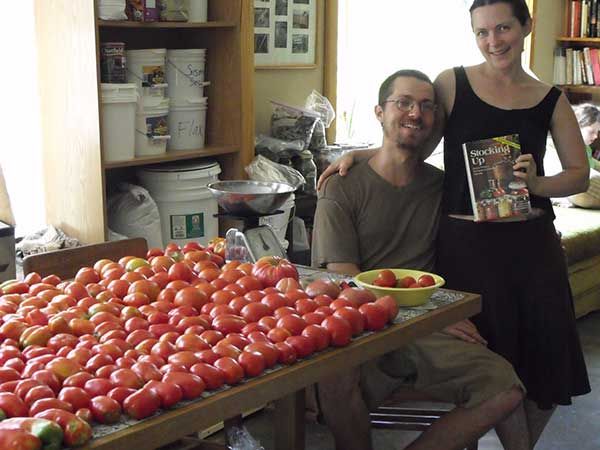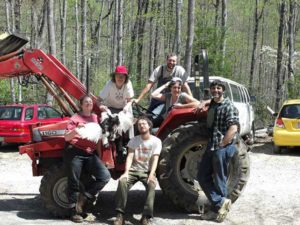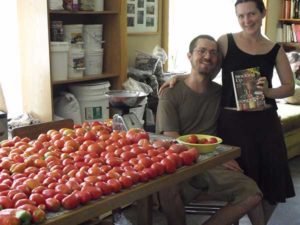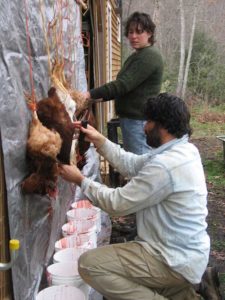YOUR CART
- No products in the cart.
Subtotal:
$0.00
BEST SELLING PRODUCTS

This article appeared in both the Black Mountain News and Communities Magazine, Fall 2012 issue – Issue #156
One-hundred-fifty years ago, 90 percent of people on earth were farmers. This meant  that every person in every family knew how to survive. Men and women knew how to work a field, fix tools, build a house, feed themselves. They knew how to raise animals, tend a winter garden, preserve food, grind grain, bake bread, and sew.
that every person in every family knew how to survive. Men and women knew how to work a field, fix tools, build a house, feed themselves. They knew how to raise animals, tend a winter garden, preserve food, grind grain, bake bread, and sew.
And then there’s the invisible stuff that is second nature to land-based people. How to make allies of neighbors, trade skills, watch for signs in nature, learn about the cycles of water, wind, cold, and heat in their bioregion, take care of each other, and—most of all—give thanks.
Children knew how to survive as well. It is said of the Amish community, even today, that children “break even” by age seven and “turn a profit” by 12. I know one Amish family in Pennsylvania whose two boys, ages eight and 10, run the entire dairy herd by themselves—50 head of cows.
We now live in a world where folks don’t quite know what to do when a light bulb burns out. Or where taking out the trash may be the only significant physical labor they do all day long. When we’re that disconnected from creating our built environment and our food sources, I believe it leaves us feeling helpless and full of anxiety. Our culture has come to value the intellect over physical work. Yet our animal selves know how far we are from the body knowledge that has kept us alive since time out of mind.
 For 10 years now I’ve managed work-exchange and internship programs at Earthaven Ecovillage, an intentional community in the southern Appalachian Mountains of western North Carolina. Young folks love to be here. They sense there is wisdom in this life. They come here to trade their time for food, housing, and an opportunity to live at an ecovillage. When I put out a listing on our website or on idealist.org asking for help, I can get up to 10 responses a week from people wanting to experience this life. When they get here they are surprised to find that they are required to work in the garden for hours, schlep building materials, and dig holes—things they’d never done in their urban or suburban lives. After a three- or six-month stint, I’ve had many of them tell me that the most valuable thing they learned was to work.
For 10 years now I’ve managed work-exchange and internship programs at Earthaven Ecovillage, an intentional community in the southern Appalachian Mountains of western North Carolina. Young folks love to be here. They sense there is wisdom in this life. They come here to trade their time for food, housing, and an opportunity to live at an ecovillage. When I put out a listing on our website or on idealist.org asking for help, I can get up to 10 responses a week from people wanting to experience this life. When they get here they are surprised to find that they are required to work in the garden for hours, schlep building materials, and dig holes—things they’d never done in their urban or suburban lives. After a three- or six-month stint, I’ve had many of them tell me that the most valuable thing they learned was to work.
All of us at Earthaven come from the middle class. Some from the lower-middle and some from the upper-middle, but “wage-earners” all. We’ve all been educated and had significant choice about our lives. And we’ve been part of the generations-long move away from physical skill into knowledge-based work.
In order to live that way, we’ve had to rely on low-paid workers from across the globe who produce our cheap goods, and on “energy slaves.” An energy slave refers to the human labor we’d need to support our modern lifestyle if we weren’t relying on oil-based technologies (i.e. energy). I’ve heard it said that the average American uses 150 energy slaves. And because our energy slaves do so much of our work for us, nearly all of us grew up knowing nothing about simple physical skills.
I was raised as the grandchild and great-grandchild of European immigrants. They worked hard to make sure that I had a better life—a life that included education and opportunity. Even though my parents and grandparents had a garden, I did little work with my hands. I never knew how to use power tools, change my oil, or fix a simple garden hose.
Now I’m a farmer. I built my farm and my house and my neighborhood by hand, with other hard-working and collective-minded folks. I continue to maintain all those things through ongoing physical labor. Every day there is physical work. There is firewood to cut, projects to finish, all manner of things to repair, animals to care for, and constant plant growth to tend and tame. There is a learning of a new skill or a deeper understanding of a plumbing, electrical, or natural system.
I came to this life through my political, social, and spiritual awareness, and from my endless curiosity about the economic discrepancies in the world. My family sometimes shakes their heads in dismay. They want me to be happy, and think that I am, but they don’t quite understand why I moved down a class level rather than up. They had given me every opportunity to do “better” than they had. Why hadn’t I taken it?
Capitalism has long offered the possibility (or the illusion) to transcend the working class. Yet the more we move up on the economic ladder, the more we deal with “information” and the less we deal with the real stuff of life. Over the years we’ve so entirely moved away from physical work that we now have a national obesity epidemic on our hands and a population of people who don’t know where the stuff that sustains their lives (food, water, and energy) comes from. It took only a few generations to get here. The road back may be longer as we recollect the wisdom that was put aside by our ancestors. The process of remembering always seems to be more arduous than does forgetting.
Some of us, living in ecovillages and other land-based situations, are on the long, steep road to figuring out how to live responsibly again—to reclaim some basic knowledge that used to be just “good, common, sense.” At Earthaven, we don’t have low-paid workers running around putting our water and waste systems in, maintaining overhead electric lines (we’re entirely off grid), or taking care of our lawns.
Last week I was shoulder deep in a pipe, cleaning out the gunk. Our rainwater system had a take-away pipe underground that was leaking. In the city, I would have called someone to come and fix that. Out here, we need to figure it out ourselves. So I stuck my hand down into the pipe to pull away all the debris, and then kept digging. This project has taken weeks of investigation, fixing problems, fitting pipes, and digging. We finally discovered a crushed pipe and were able to fix the system. Sometimes, when working on a complex physical project, the ignorance and paralysis are hard to overcome. “Can’t someone else do this?,” “I’m not strong enough,” “I don’t know enough,” “It’s too hard,” we think.
At Earthaven, we have a few choices:
1.We can pay someone to do all that stuff for us.
2.We can live with a lot lower standard of living than we grew up with in mainstream culture.
3.We can learn to be working class.
What you realize after being forced to do all these core-to-life tasks is that working feels good. The paralysis of a life of leisure and body-ignorance begins to fall away. Numb spots in the brain and in the muscles of the body start to activate and remember how to work together. The body responds to integration. Empowerment starts to creep in. Working helps us remember our evolutionary potential—what these physical bodies were made for. And getting it right gives us the courage and confidence to keep trying. When using a scythe or digging a trench, we often joke that we should set up an expensive “gym” on our farm so the city people can come get a good workout and actually help us accomplish something important at the same time. We imagine that everyone will benefit.
Part of the hope of ecovillages is to learn the skills that we’ve all lost through cultural amnesia—to regain strength in our muscles, brains, hands, and hearts to do what it takes to be responsible for our lives. And responsibility for our lives means not shipping out our waste for someone else to deal with, or importing food that someone else has grown, or being ignorant about where our water, heat, and power come from.
The work is hard. The doing of it is crucial. And the reward is indescribably satisfying.
land-based knowledge, radical responsibility, rural wisdom, sacred economics, working class